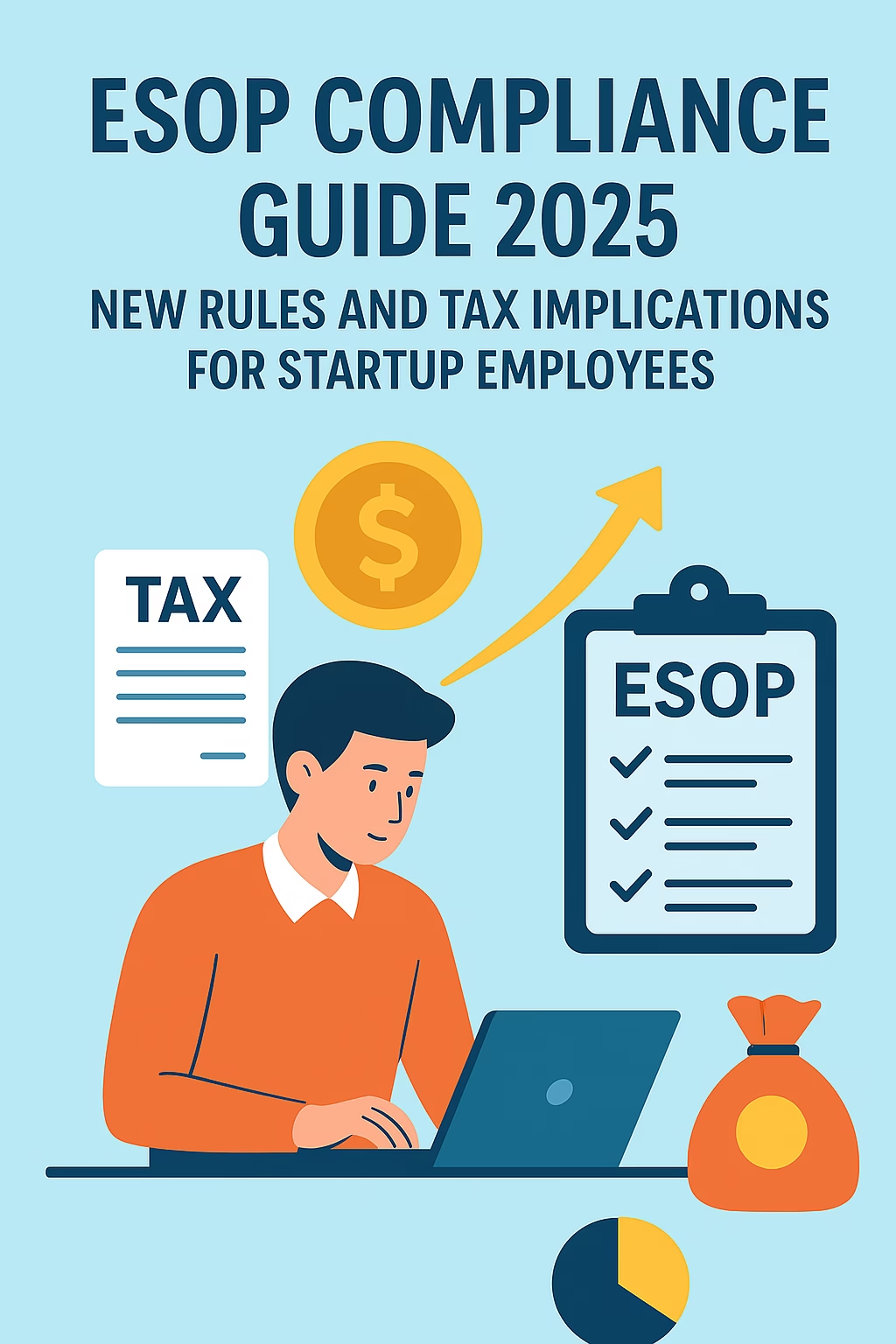Employee Stock Option Plans (ESOP ‘s) have become a vital part of compensation in India’s startup ecosystem. They help young companies attract top talent, retain key employees, and align incentives with long-term growth. However, the regulatory, compliance, and taxation aspects surrounding ESOPs are evolving rapidly, and both employers and employees need to stay updated.
This guide explains the latest ESOP rules, compliance requirements, and tax implications for 2025 — designed for startup founders, HR teams, and employees to understand how to structure, manage, and report ESOPs effectively.
What’s New in 2025
- Tax at Exercise: Employees are taxed on the difference between the fair market value (FMV) of shares and the exercise price when they exercise their ESOPs. This amount is treated as a salary perquisite and attracts TDS.
- Capital Gains at Sale: When employees sell the shares later, any appreciation or loss from the time of exercise is taxed under capital gains — short-term or long-term depending on how long the shares were held.
- Tax Deferral for Startups: Recognised startups can defer TDS on ESOPs for up to five years or until the shares are sold, whichever is earlier.
- Greater Regulatory Oversight: Authorities are increasing scrutiny on how ESOPs are granted and disclosed, particularly in cases where founders or related parties receive allocations.
- Cross-Border ESOP Clarifications: Companies with foreign holding structures must ensure compliance with FEMA and GST norms, especially for employees receiving shares in overseas entities.
Regulatory Framework
The ESOP process is governed by multiple laws and regulations:
- For Listed Companies: SEBI’s Share-Based Employee Benefits Regulations define how ESOPs must be structured, disclosed, and reported.
- For Unlisted Startups: The Companies Act, 2013 outlines procedures such as shareholder approvals, filings, and maintaining statutory registers.
- For Taxation: The Income-tax Act determines how ESOPs are taxed at different stages, including perquisite valuation and capital gains.
- For Cross-Border Plans: FEMA and RBI guidelines come into play if ESOPs involve foreign entities or non-resident employees.
How ESOPs Are Taxed
- At Grant: No tax is applicable when the ESOPs are granted.
- At Vesting: Still no tax, as ownership is not yet transferred.
- At Exercise: The taxable event occurs here.
- Taxable Value = FMV on exercise date – Exercise Price
- This is treated as part of the employee’s salary, and the employer must deduct TDS accordingly.
- At Sale: When shares are sold, the difference between the sale price and FMV on exercise date is taxed as capital gains.
- If held for more than 24 months (for unlisted shares), the gain is long-term and taxed at 20% with indexation.
- If sold earlier, it is treated as short-term and taxed as per the individual’s slab rate.
Example:
If an employee exercises 1,000 options at ₹10 per share when the FMV is ₹150, the perquisite value is ₹1,40,000 — taxed as salary. If those shares are later sold at ₹300 each, an additional ₹1,50,000 is taxable as capital gains.
Startup Tax Deferral Scheme
Eligible startups can defer ESOP-related taxes for up to five years or until the employee sells the shares, whichever comes first. This provision eases the immediate cash burden on employees who might otherwise have to pay tax before monetising their shares.
Compliance Checklist for Startups
Before Launching an ESOP Plan:
- Prepare a detailed ESOP policy outlining eligibility, vesting schedules, exercise price, and exit mechanisms.
- Obtain board and shareholder approval and file necessary resolutions with the Registrar of Companies.
- If using an ESOP Trust, ensure it complies with governance and accounting norms.
At the Time of Exercise:
- Conduct a fair market valuation for unlisted shares and maintain documentation.
- Reflect the perquisite value in payroll and deduct appropriate TDS.
- Update statutory registers and issue share certificates or demat shares.
Ongoing:
- Maintain accurate records of all ESOP grants, exercises, and lapses.
- Disclose ESOP details in annual reports and board meetings.
- Ensure compliance with GST, RBI, and SEBI if shares are issued across borders.
Common Pitfalls and Lessons
Recent regulatory actions have highlighted lapses where companies granted ESOPs to ineligible persons or failed to follow disclosure norms. Non-compliance can result in penalties, forfeiture of options, or reputational damage. Startups should ensure ESOPs are only offered to eligible employees, with clear board and shareholder approvals and transparent disclosures.
Key Tips for Employees
- Plan for Tax: Exercise timing matters. Understanding when tax arises helps avoid liquidity issues.
- Maintain Records: Keep all grant letters, exercise documents, and valuation reports for accurate tax filing.
- Understand Liquidity Options: For unlisted companies, exits can take time — factor that into your decision to exercise options.
- For NRIs: Ensure compliance with RBI and FEMA guidelines for repatriation and taxation.
Best Practices for Founders and HR Teams
- Define vesting schedules, exit clauses, and valuation methodology clearly in ESOP policy documents.
- Keep a transparent communication channel with employees about vesting status and tax obligations.
- Align ESOP pool size with business goals and funding plans.
- Maintain clean records — investors increasingly scrutinise ESOP management during due diligence.
Conclusion
ESOPs remain one of the most effective tools for startups to build ownership culture and reward performance. But as compliance and taxation become more stringent, startups must ensure transparent structures, timely filings, and accurate tax handling.
For employees, understanding when and how taxes apply — and planning accordingly — can turn ESOPs from a paperwork burden into a genuine wealth-building opportunity.

